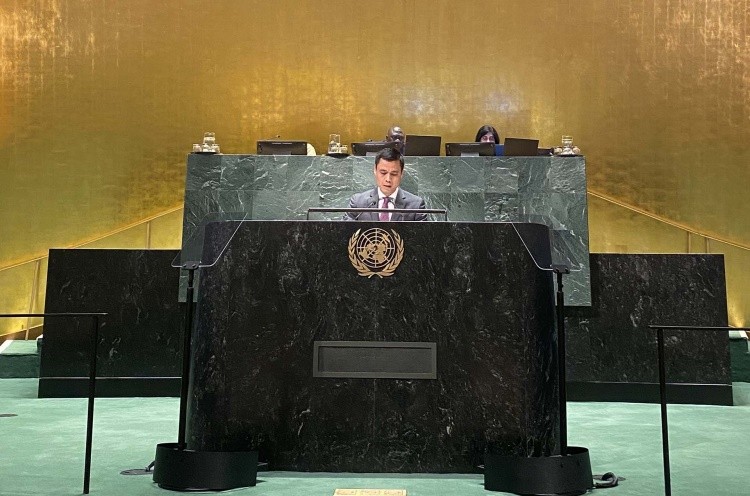
Vietnam makes active, responsible contributions to IAEA Board of Governors’s activities 2021-2023
Latest
 |
| Ambassador Dang Hoang Giang, Permanent Representative of Vietnam to the United Nations, addresses the debate on the 2022 annual report of the IAEA at the UN General Assembly on November 8-9. (Photo: VNA) |
Ambassador Dang Hoang Giang, Permanent Representative of Vietnam to the United Nations acknowledged and appreciated the amount of work that the IAEA has completed in the past year, and thanked the IAEA and other members of the IAEA Board of Governors for cooperating with Vietnam while it serves as a member of the board in the 2021-2023 tenure.
Ambassador Giang appreciates the results that the IAEA has achieved in the field of nuclear inspection and its leading role in supporting countries, including Vietnam, to ensure nuclear security and safety.
Ambassador Giang said that Vietnam and its partners are developing the Vietnamese Information Management System (VIMS) to enable nuclear facilities to submit reports online, which helps to simplify the inspection and supervision process and report-making process.
The Ambassador hailed IAEA's technical cooperation programmes with many leading initiatives such as nuclear applications in tackling zoonotic diseases (the Zoonotic Disease Integrated Action - ZODIAC), treating marine plastic waste (NUTEC Plastic), improving access to cancer diagnosis and treatment using radiotherapy (Rays of Hope) and many projects supporting climate change mitigation and adaptation.
Through technical assistance projects, the IAEA has helped Vietnam implement nuclear reactor research projects and nuclear energy applications in various fields such as health, agriculture, industry, and research, environmental protection, water resources, and nuclear safety infrastructure development.
Regarding emerging nuclear energy technology, the Ambassador said that technologies such as Small Modular Reactors (SMRs) and Floating Nuclear Power Platforms (FNPPs) pose challenges and potential impacts on the current legal framework as well as security, safety and navigation. The development, deployment and operation of these nuclear energy technologies should be conducted following international law, including the United Nations Convention on the Law of the Sea (UNCLOS).
Vietnam supports a cautious and step-by-step approach within the IAEA framework for research, development, licensing, management and operation of FNPPs through close consultation with involved countries.
On this occasion, the Vietnamese Ambassador reaffirmed Vietnam’s support for the IAEA to continue performing its functions and tasks, contributing to promoting the application of nuclear science and technology for peace, stability, cooperation and sustainable development.













